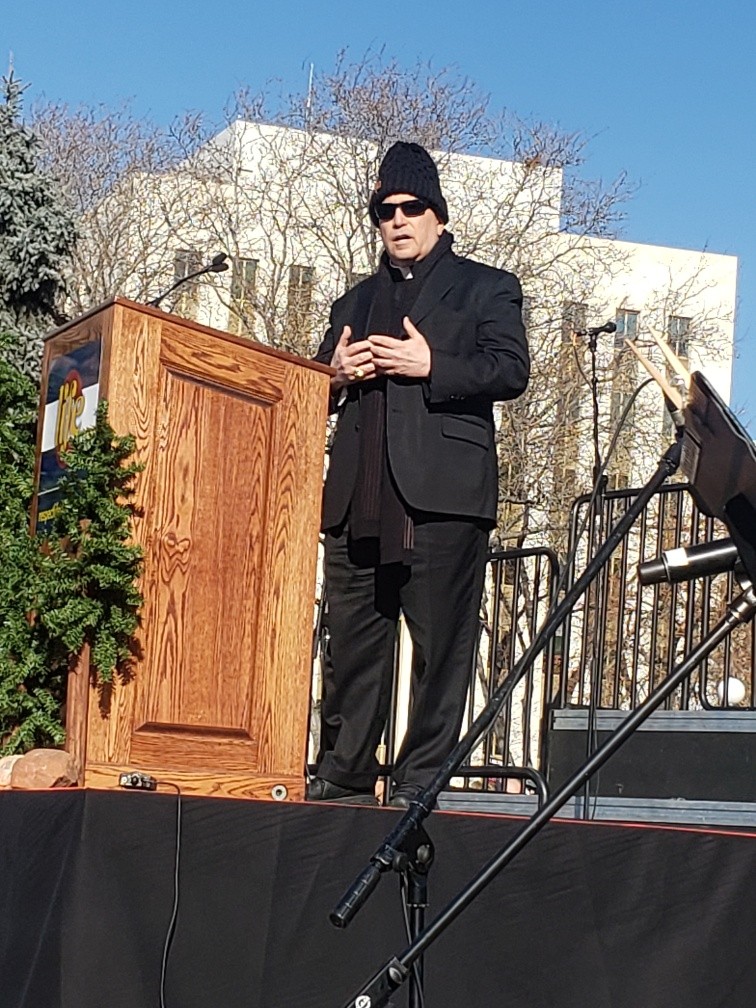In a statement about the Club Q massacre Sunday, Denver’s Catholic Bishop Samuel Aquila stated that “random acts of killing innocent human beings must be condemned by a civil society.”
“As we seek to overcome evil with good, we must promote the dignity of every human being created in the image and likeness of God,” he wrote.

But Aquila draws on the same language to discriminate against LGBTQ people — for example, when it comes to teaching sex education in Colorado schools.
“We know that God made us male and female, in his image and likeness, but the comprehensive curriculum route which most schools will likely adopt teaches innocent children this is not true,” he wrote in a 2019 open letter urging Catholics to fight a sex education bill allowing discussion of LGBTQ issues.
In addition, Denver’s Catholic Archdiocese, led by Aquila, has taken a leading role in discrimination against LGBTQ people in Colorado, going so far as to initiate a program in local Catholic churches aimed at “healing” LGBTQ people by turning them into heterosexuals. This is intended to be achieved through a model developed by homophobe Andrew Camiskey, author of The Kingdom of God and the Homosexual (Revised), relying on small group sessions, prayer, and reparative and developmental psychology. As such, Aquila’s program skirts Colorado’s ban on conversion therapy, which doesn’t apply to unlicensed practitioners at private religious institutions.
This conversion-therapy program is in keeping with Aquila’s multi-pronged advocacy campaigns, at the state Legislature and elsewhere, to “bring [LGBTQ people] healing and lead them to their true identity as sons or daughters of the Father, unlike the false freedom promoted by gender theory,” as Aquila wrote in 2018.
Just last week, The Denver Post‘s Elizabeth Hernandez reported that Denver’s Catholic archdiocese has instructed Catholic schools not to enroll or re-enroll transgender or gender non-conforming students, to treat gay parents differently than heterosexual ones, and, broadly, to operate under the guidance that the “spread of gender ideology presents a danger to the faith of Christians.”
Aquila’s discrimination at times grows even darker, as evident in a 2018 tweet of an article with the headline, “Active Homosexuality in the Priesthood Helped Cause This Crisis” (the crisis being pedophilia in the Catholic church). The archbishop hasn’t removed the tweet nor commented on it beyond once saying, through a spokesperson, that not all LGBTQ people are pedophiles. “He’s not suggesting they are one in the same,” wrote Aquila’s spokesman in 2019, mostly standing behind the tweet but leaving open the possibility that, for some LGBTQ people, it’s not.
Despite all this, Aquila and his conservative Catholic allies — as opposed to the majority of Catholics who accept homosexuality — tell us they don’t actually hate LGBTQ people. They have compassion toward them, they say.
And Aquila’s hateful-sounding language, they say, is actually inspired not by hate at all but by the religious belief that being gay is wrong according to the Bible, a claim that Ari Armstrong addressed this week here.
The fact is, for most people these days, according to polls, much of Aquila’s rhetoric on LGBTQ issues is discriminatory.
So I asked Aquila’s spokeswoman, Kelly Clark, if she thinks Aquila’s attacks against LGBTQ people, even if you accept that they are motivated by compassion, can still contribute to hatred toward LGBTQ people or hate crimes like the one we may have witnessed Sunday at Club Q (the shooter’s motives are not yet known).
“I have read the statements you pinpointed, and I do not find any statements attacking LGBTQ+ people from Archbishop Aquila,” Clark responded via email. “The Archbishop’s statements, and Church teaching, are grounded in the Catholic/natural law belief that the basic cell of a healthy society is the family, which is a husband, wife, and if so blessed, children. Our beliefs don’t align with the current, culturally-approved norms around sexuality, but this in no way means that we are hateful or not inclusive. Our doors remain open to anyone seeking greater understanding of the faith, a relationship with Jesus Christ or is even just curious. Given our comprehensive respect for human life, the Church strives to take great care in treating people from all walks of life with compassion. Those suggesting the Church’s compassionate approach leads to violence is baseless.”



